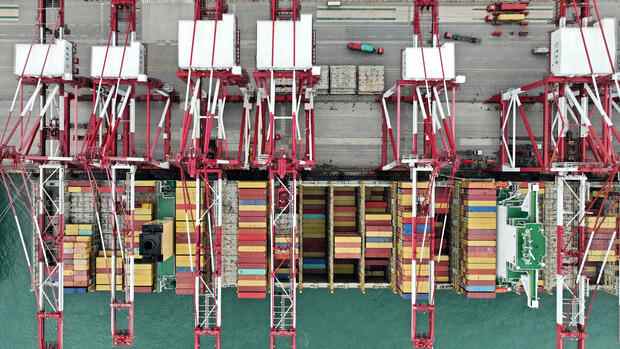Exports rose by 18 percent in July.
(Photo: dpa)
Beijing China’s exports are still increasing. However, growth slowed down surprisingly sharply in August. Compared to the same period last year, exports increased by 7.1 percent, as announced by the Chinese customs authority on Wednesday. Experts had expected double-digit growth. In July, the increase was still 18 percent.
Exports have so far been one of the last remaining growth drivers in the Chinese economy. Industrial production and consumption are weakening due to the ongoing uncertainty caused by recurring corona lockdowns. In addition, there is the crisis on the real estate market, which is getting worse.
The growth target of 5.5 percent 2022 issued by the government is therefore considered to be hardly achievable. The International Monetary Fund (IMF) only expects growth of 3.3 percent. However, falling export growth could mean that lower growth expectations will also have to be revised downwards.
Exports have been “one of the few bright spots in China’s economy,” says Hong Hao, chief economist at hedge fund Grow Investment Group. He assumes that growth will now slow further.
Top jobs of the day
Find the best jobs now and
be notified by email.
“The sharper-than-expected slowdown in China’s export growth is another sign the recovery is losing momentum – and needs more policy support,” said David Qu, chief economist at finance agency Bloomberg. “We expect trade to remain under pressure for the remainder of the year.”
Reasons for the declining global demand for products “Made in China” include the rising prices for energy and other goods that weigh on the global economy. Energy bottlenecks as a result of the heat wave and production interruptions due to lockdowns also contributed to the decline in exports.
Imports are developing worse than expected
Imports also only rose by 0.3 percent in August and thus developed worse than expected. Michael Pettis, a finance professor at Peking University, says this shows how “wobblingly weak” domestic demand remains.
The People’s Republic’s zero-Covid policy is weighing on China’s economy.
(Photo: dpa)
Growing insecurity, high unemployment and pressure on wages made it completely impossible for Chinese households to increase their consumption and thus their imports.
Despite the generally weak import development for China, there was good news for German exporters: despite everything, German exports to China were able to post an increase of 4.9 percent. German imports from China rose by 9.6 percent, as reported by customs.
>>Read here: Concerns about China’s economy are growing – central bank cuts interest rates again
China’s trade with Russia, against which international economic sanctions had been imposed for its invasion of Ukraine, continued to develop strongly. China, which politically stands behind Russian President Vladimir Putin, imported 59.3 percent more from Russia – mainly energy. Conversely, Chinese exporters delivered 26.5 percent more goods to the neighboring country.
With agency material
More: “Who has my money?” – Property buyers in China are on strike, the politicians are alarmed
